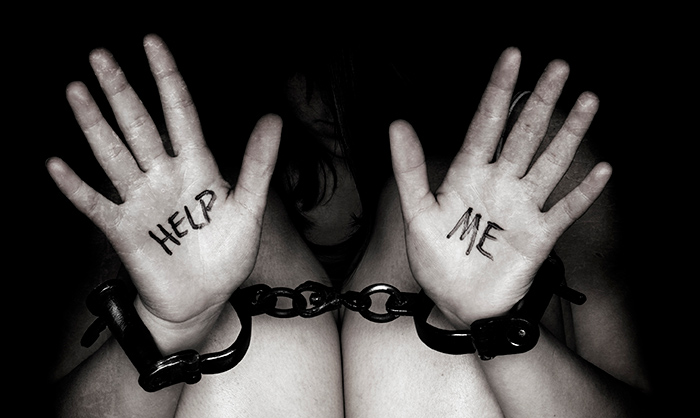I want my freedom to get on in life, says victim of Nigeria-to-France traffickers

During the first week of testimony in the trial of 16 members of a mostly female network of Nigerian human traffickers operating forced prostitution rings in France, the judge asked plaintiffs what they hoped would result from the case.
Rita O., who has been in France since being trafficked in 2012, responded: “For them to go to prison. I was afraid before. But now that they are already in custody, I feel freer to speak. I want my freedom back and to be able to get ahead in my life.”
A verdict is expected at the end of this month. The traffickers went on trial last week at the high court of Paris, facing their accusers as the trafficked women testified to being lied to, beaten and raped.
Plaintiffs began giving testimony on May 14 against a group known as the “Authentic Sisters,” saying they were trafficked from Nigeria, abused and forced into prostitution.
While eight women are testifying in the case, a total of 49 victims have come forward. The defendants are being tried for procuring and trafficking in human beings, crimes that carry a maximum sentence of 10 years.
“It is rare to get this many women to testify,” said a social worker for Bus De Femme, who did not want to be named for security reasons. Bus De Femme, an NGO that provides a range of health and social services to sex workers in Paris, provided pro-bono (free service) lawyers for the victims in the case.
In some cases the group’s volunteers and staff worked for years with the women to build up enough trust to convince them to testify.
“These girls are often incredibly traumatised and terrified to speak out,” the social worker said. Nigerian members of Bus De Femme’s staff, some of whom are former sex workers themselves, played an integral part.
Accused
Of the 16 accused, 11 are women and five are men. Four are currently serving time in prison for previous offences. The prosecution alleged that the accused operated their prostitution network across multiple countries, including France, Italy and Spain.
During the first week the judge heard testimony from four women and the preliminary defense from two alleged traffickers, Mark “Hilary” Irorere and his wife Happy Irorere, who are thought to have been the ringleaders responsible for coordinating the women’s affairs once they arrived in Europe.
While the details of each victim’s testimony are different, important elements are common throughout, indicating there was a systematic approach to the trafficking operations.
Our experiences—Victims
The plaintiffs, some under 18, claim that before leaving Nigeria they were promised economic opportunities in France unrelated to sex work.
One plaintiff testified she was told she would be working in a new restaurant operated by one of the accused; another that she would work as a nanny.
The plaintiffs testified that they were given fake passports and visas, which they would pay for from the money they earned in the future. They were brought to the home of their future madame and kept there under strict restrictions, except when they were out seeking new clients.
The women were forced to pay for expenses ranging from food to housing to various fees, totaling exorbitant amounts far in excess of what they were told upon beginning their journeys.
Plaintiffs said they had no idea they would be forced into prostitution until condoms were placed in their hands for their first shift. They were then told the rates to charge for their services.
The debt owed by each of the 49 women ranged from €50,000 to €70,000 by the time they were settled in France.
During their time in court, the women detailed the physical and sexual abuse they suffered, both at the hands of their pimps and from their clients.
Like many of the girls, Rose was a virgin when she was forced into the sex trade and later experienced health issues.
“When I told my madame that some clients were bad to me and I was afraid I had HIV, she responded to me that she didn’t care,” Adaro said.
“She said that I could die, but all she cared for was the money I was getting her.”
When traffickers are victims
Those facing trial for trafficking the plaintiffs from Nigeria to France are accused of varying levels of involvement. Some claim they started out as trafficked victims themselves, a situation that can complicate sentencing.
Joseph Hazan, the defence attorney for 32-year-old Rita A., one of the accused, claims that is the case with his client.
“My client was a prostitute for five years because her family said, ‘We can’t eat, so you must go (to Europe)’,” Hazan said in an interview a few days before the trial.
After five years she became pregnant and stopped sex work, so the family sent two of her sisters to France to replace the lost income, he explained. Soon after, other families from Benin City asked for her to organise travel for their own daughters to join her.
“That’s how she became somewhat of a business … she isn’t innocent and she will definitely be (found) guilty, but I will try to explain she is not the boss of this organisation,” he said.
Hazan also claimed the victims were complicit and fully aware that they were coming to Europe to be sex workers: “They say they didn’t know, but they knew you can’t work in France without papers. They know. They knew that all people like that end up in the street.”